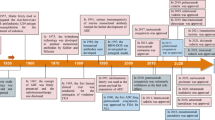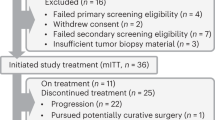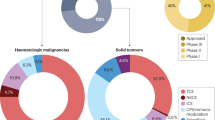Abstract
Overexpressing of P-glycoprotein (Pgp) has been shown to be responsible for cancer resistance to multiple chemotherapeutic agents. Immunotherapy with biological agents, such as bispecific antibodies (BsAbs), may represent a promising approach to overcome the emergence of drug resistance. Here we constructed a recombinant BsAb, a diabody, with specificities to both CD3 on human T-lymphocyte and Pgp on cancer cells. The diabody was produced in Escherichia coli in a soluble functional form and purified by an affinity chromatography with a yield of >4 mg/l culture medium in shaker flask. The diabody binds to both CD3 on T-lymphocytes and Pgp on multidrug-resistant (MDR) tumor cells with affinities that are comparable to its respective parental single chain Fv molecules. In the presence of activated human peripheral blood lymphocytes (PBLs), the diabody mediates effectively the lysis of the Pgp-overexpressing human leukemia K562/A02 and epidermoid carcinoma KBv200 cells, but is much less potent in mediating the lysis of the parent K562 and KB cells. Further, the diabody localized selectively within the K562/A02 xenografts in mice. When combined with activated PBL, the diabody significantly inhibited the growth of K562/A02 and KBv200, but had no effect on K562 and KB xenografts. In contrast, treatment with doxorubicin, a standard chemotherapeutic agent, only inhibited the growth of K562 and KB, but had no effect on K562/A02 and KBv200 xenografts. Taken together, our results suggest that the anti-Pgp × anti-CD3 diabody may have a great potential in the treatment of various MDR cancers.
This is a preview of subscription content, access via your institution
Access options
Subscribe to this journal
Receive 12 print issues and online access
$259.00 per year
only $21.58 per issue
Buy this article
- Purchase on Springer Link
- Instant access to full article PDF
Prices may be subject to local taxes which are calculated during checkout







Similar content being viewed by others
References
Deuchars KL, Ling V . P-glycoprotein and multidrug resistance in cancer chemotherapy. Semin Oncol 1989; 16: 156–165.
Moscow JA, Schneider E, Ivy SP, Cowan KH . Multidrug resistance. Cancer Chemother Biol Response Modif 1997; 17: 139–177.
Endicott JA, Ling V . The biochemistry of P-glycoprotein-mediated multidrug resistance. Annu Rev Biochem 1989; 58: 137–171.
Gottesman MM, Pastan I . Biochemistry of multidrug resistance mediated by the multidrug transporter. Ann Rev Biochem 1993; 62: 385–427.
Jimenez RE, Zalupski MM, Frank JJ, Du W, Ryan JR, Lan ducas DR . Multidrug resistance phenotype in high grade soft tissue sarcoma: correlation of P-glycoprotein immunohistochemistry with pathologic response to chemotherapy. Cancer 1999; 86: 976–981.
Ling V . Multidrug resistance: molecular mechanisms and clinical relevance. Cancer Chemother Pharmacol 1997; 40 (Suppl): S3–S8.
Tsukamoto F, Shiba E, Taguchi T, Sugimoto T, Watanabe T, Kim SJ et al. Immunohistochemical detection of P-glycoprotein in breast cancer and its significance as a prognostic factor. Breast Cancer 1997; 4: 259–263.
Bradley G, Ling V . P-glycoprotein, multidrug resistance and tumor progression. Cancer Metast Rev 1994; 13: 223–233.
Kitadai Y, Ellis LM, Takahashi Y, Bucana CD, Anzai H, Tahara E et al. Multiparametric in situ messenger RNA hybridization analysis to detect metastasis-related genes in surgical specimens of human colon carcinomas. Clin Cancer Res 1995; 1: 1095–1102.
Lehne G . P-glycoprotein as a drug target in the treatment of multidrug resistant cancer. Curr Drug Targets 2000; 1: 85–99.
Naito M, Tsuruo T . Monoclonal antibodies to P-glycoprotein: preparation and applications to basic and clinical research. Methods Enzymol 1998; 292: 258–265.
Hamada H, Tsuruo T . Functional role for the 170- to 180-kDa glycoprotein specific to drug-resistant tumor cells as revealed by monoclonal antibodies. Proc Natl Acad Sci USA 1986; 83: 7785–7789.
Tsuruo T, Hamada H, Sato S, Heike Y . Inhibition of multidrug-resistant human tumor growth in athymic mice by anti-P-glycoprotein monoclonal antibodies. Jpn J Cancer Res 1989; 80: 627–631.
Iwahashi T, Okochi E, Ariyoshi K, Watabe H, Amann E, Mori S et al. Specific targeting and killing activities of anti-P-glycoprotein monoclonal antibody MRK16 directed against intrinsically multidrug-resistant human colorectal carcinoma cell lines in the nude mouse model. Cancer Res 1993; 53: 5475–5482.
Mechetner EB, Roninson IB . Efficient inhibition of P-glycoprotein-mediated multidrug resistance with a monoclonal antibody. Proc Natl Acad Sci USA 1992; 89: 5824–5828.
FitzGerald DJ, Willingham MC, Cardarelli CO, Hamada H, Tsuruo T, Gottesman MM et al. A monoclonal antibody-Pseudomonas toxin conjugate that specifically kills multidrug-resistant cells. Proc Natl Acad Sci USA 1987; 84: 4288–4292.
Niv R, Assaraf YG, Segal D, Pirak E, Reiter Y . Targeting multidrug resistant tumor cells with a recombinant single-chain Fv fragment directed to P-glycoprotein. Int J Cancer 2001; 94: 864–872.
Cao Y, Lam L . Bispecific antibody conjugates in therapeutics. Adv Drug Deliv Rev 2003; 55: 171–197.
Withoff S, Helfrich W, de Leij LF, Molema G . Bi-specific antibody therapy for the treatment of cancer. Curr Opin Mol Ther 2001; 3: 53–62.
Weiner LM . Bispecific antibodies in cancer therapy. Cancer J Sci Am 2000; 6: S265–S271.
Van Ojik HH, Valerius T . Preclinical and clinical data with bispecific antibodies recruiting myeloid effector cells for tumor therapy. Crit Rev Onco/Hematol 2001; 38: 47–61.
Xu YF, Xiong DS, Yang CZ, Lai ZZ, Liu HZ, He XP et al. The effects of amino acid mutations of an anti-CD3 antibody (HIT3a) on its expression in E. coli. Chin J Hematol 2001; 22: 252–255.
Gao YD, Xiong DS, Peng H, Xu YF, Shao XF, Fan DM et al. Expression and characterization of a recombinant scFv antibody directed against P-glycoprotein. Chin J Immunol 2004, (in press).
Shen D, Yang X, Yang C, Chen Z . Production and characterization of HIT3a, a monoclonal antibody directed against CD3. Acta Acad Med Sin 1993; 15: 157–162.
Xiong DS, Yang CZ, Shao XF, Xu YF, Xu LZ, Wang XH . Generation and characterization of monoclonal antibodies against P-glycoprotein (Pgp). Chin J Hematol 1999; 20: 326–327.
Yang CZ, Luan FJ, Xiong DS, Liu BR, Xu YF, Gu KS . Multidrug resistance in leukemic cell line K562/A02 induced by doxorubicin. Zhongguo Yao Li Xue Bao 1995; 16: 333–337.
Zhang XH, Zhang FY, Ji XJ, Li ZY . Vincristine-resistant human KB cell line and mechanism of multidrug resistance. Yao Xue Xue Bao 1994; 29: 246–251.
Xiong DS, Xu YF, Liu HZ, Peng H, Shao XF, Lai ZZ et al. Efficient inhibition of human B-cell lymphoma xenografts with an anti-CD20 × anti-CD3 bispecific diabody. Cancer Lett 2002; 177: 29–39.
Zhu Z, Rockwell P, Lu D, Kotanides H, Pytowski B, Hicklin DJ et al. Inhibition of vascular endothelial growth factor-induced receptor activation with anti-kinase insert domain-containing receptor single-chain antibodies from a phage display library. Cancer Res 1998; 58: 3209–3214.
Greenwood FC, Hunter WM, Glover JC . The preparation of 131I-labeled human growth hormone of high specific radioactivity.J Biochem 1963; 89: 114–120.
Frankel ME, Gerhard W . The rapid determination of binding constants for antiviral antibodies by a radioimmunoassay. An analysis of the interaction between hybridoma proteins and influenza virus. Mol Immunol 1979; 16: 101–106.
Zhu Z, Lewis GD, Carter P . Engineering high affinity humanized anti-p185HER2/anti-CD3 bispecific F(ab′)2 for efficient lysis of p185HER2 overexpressing tumor cells. Int J Cancer 1995; 62: 319–324.
Zhu Z, Zapata G, Shalaby MR, Snedecor B, Chen H, Carter P . High level secretion of a humanized bispecific diabody from Escherichia coli. Bio/Technology (NY) 1996; 14: 192–196.
Van Dijk J, Tsuruo T, Segal DM, Bolhuis RL, Colognola R, van de Griend RJ et al. Bispecific antibodies reactive with the multidrug-resistance-related glycoprotein and CD3 induce lysis of multidrug-resistant tumor cells. Int J Cancer 1989; 44: 738–743.
Heike Y, Okumura K, Tsuruo T . Augmentation by bispecific F(ab′)2 reactive with P-glycoprotein and CD3 of cytotoxicity of human effector cells on P-glycoprotein positive human renal cancer cells. Jpn J Cancer Res 1992; 83: 366–372.
Carter P . Bispecific human IgG by design. J Immunol Methods 2001; 248: 7–15.
Merchant AM, Zhu Z, Yuan J, Goddard A, Adams CW, Presta LG et al. An efficient route to human bispecific IgG. Nat Biotechnol 1998; 16: 677–681.
Zhuang Z, Jimenez X, Witte L, Zhu Z . An efficient route to the production of an IgG-like bispecific antibody. Protein Eng 2000; 13: 361–367.
Acknowledgements
This work was supported by grants from The Natural Science Foundation of China (NSFC) – General Projects (Grant number: 39900186) and from the ‘National High Technology Research and Development Program (863 Program)’ of the Chinese Government (Grant number: 2002AA2Z346D).
Author information
Authors and Affiliations
Corresponding authors
Rights and permissions
About this article
Cite this article
Gao, Y., Xiong, D., Yang, M. et al. Efficient inhibition of multidrug-resistant human tumors with a recombinant bispecific anti-P-glycoprotein × anti-CD3 diabody. Leukemia 18, 513–520 (2004). https://doi.org/10.1038/sj.leu.2403267
Received:
Accepted:
Published:
Issue Date:
DOI: https://doi.org/10.1038/sj.leu.2403267
Keywords
This article is cited by
-
Aberrant DNA Methylation in Chronic Myeloid Leukemia: Cell Fate Control, Prognosis, and Therapeutic Response
Biochemical Genetics (2018)
-
TAT-CC fusion protein depresses the oncogenicity of BCR-ABL in vitro and in vivo through interrupting its oligomerization
Amino Acids (2013)
-
Improvement of tumor targeting and antitumor activity by a disulphide bond stabilized diabody expressed in Escherichia coli
Cancer Immunology, Immunotherapy (2009)
-
A bispecific diabody directed against prostate-specific membrane antigen and CD3 induces T-cell mediated lysis of prostate cancer cells
Cancer Immunology, Immunotherapy (2008)
-
Antibody targeted drugs as cancer therapeutics
Nature Reviews Drug Discovery (2006)



